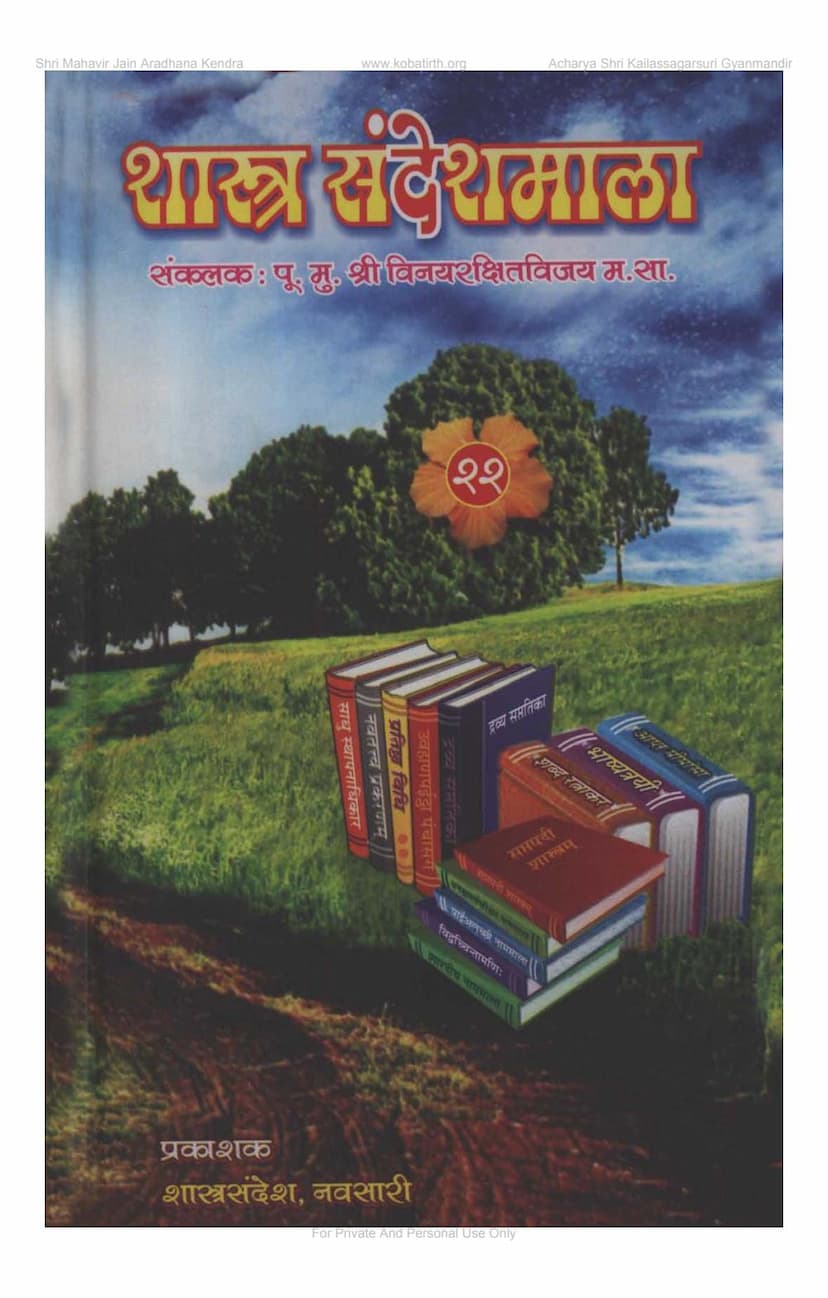Shastra Sandeshmala Part 22
Added to library: September 2, 2025

Summary
This comprehensive Jain text, "Shastra Sandeshmala Part 22," compiled by Vinayrakshitvijay and published by Shastra Sandesh Mala, is a collection of various Jain scriptures and works, focusing on Achara (conduct), Prarambhik (preliminary principles), Namamala (lexicons/dictionaries of names), and Vyakaran Shastra (grammar).
Here's a summary of its key aspects based on the provided text:
Overall Content:
- The book is part of a larger series, "Shastra Sandeshmala," with this volume being the 22nd.
- It compiles a significant amount of Jain literature, including over 137 chapters and approximately 18,000 verses, building upon earlier volumes that contained over 400 chapters and 70,000 verses.
- The publication is made possible through the "Gyan Nidhi" (knowledge treasury) of various Sanghams (religious communities) and is dedicated to the spread of Jain knowledge.
Specific Sections and Themes (as indicated by the table of contents and text snippets):
The table of contents reveals a diverse range of topics covered within this volume, demonstrating a breadth of scholarly and practical Jain teachings. Key areas include:
- Dravyasaptatika: Likely a treatise on the seven categories of substances (dravyas) in Jainism.
- Pakshikasaptatika and Pakshika Gatha Vichar: Discussions related to the fortnightly observances (Pakshika) in Jain practice, likely detailing rituals, principles, and verses associated with them.
- Bimba Pariksha and Bimba Puja Pariksha: Examination and worship of divine images (Bimba/Pratima), covering aspects like their suitability, defects, and proper rituals.
- Pratishtha Sangrahakavyam and Pratishtha Vidhi: Works detailing the rituals and procedures for consecrating religious idols and establishments.
- Yoga Vihana Prayaranam and Yododvahilakshanaavali: Texts on spiritual practices, yogic disciplines, and the characteristics of individuals engaged in them.
- Navasurya Pabrunhana Anushasti and Pindaloyana Vihana Prayaranam: Works possibly related to specific devotional practices or dietary regulations.
- Shravaka Vidhi and Poshadha Vidhi Sangrahani Gatha: Guidelines and verses for the conduct of lay disciples (Shravaka) and observances like Poshadha.
- Upadhana Vahi Prashamsa Prakaranam and Upadhana Peittha Panchasaga: Texts related to specific ascetic observances or rituals.
- Pratikramana-Samachari: The procedures and conduct for atonement (Pratikramana).
- Malopaburuhana: Likely dealing with practices to enhance spiritual progress or knowledge.
- New Gani Gachcha Anushasti and Gani Ganinayor Lakshanaavali: Treatises on the characteristics and conduct of Jain monks and their leadership.
- Navya Mahattara Anushasti: Guidelines or teachings related to senior renunciates.
- Sadhu Sthapanadhikara: The proper procedures and rules for establishing monks.
- Rochini Jnatopanayaha and Alochana Vidhi: Texts possibly related to understanding or confession of faults.
- Panchak Paribani and Kshapakasya Aloyana Ante Bhavana: Works possibly on purification, faults, and meditative practices.
- Apta Mimansa: A critical examination of authoritative figures or scriptures.
- Samaktva Stava: Hymns or praises of the correct faith (Samaktva).
- Sthapana Panchashika: Fifty verses related to establishing or consecrating something.
- Saptapadi Shastra: A treatise on the seven vows or steps.
- Navatattva Prakaranam (multiple entries): Detailed discussions on the nine fundamental principles of Jainism.
- Jivavyavasthapana Shattrinsatika and Jiva Ajiva Karmashtaka Prakaranam: Works on the classification of souls, non-souls, and karma.
- Dikchatushka Jiva Alpabahutva: A discussion on the relative quantity of souls in different directions.
- Chaitya Vandan Bhashyam and Guru Vandan Bhashyam: Treatises on the principles and significance of worshipping congregational centers (Chaitya) and venerating spiritual mentors (Guru).
- Pratyakhyana Bhashyam: Principles related to renunciation.
- Sanyam Manjari: A collection of verses related to self-control.
- Jayanti Prakaranam: A work possibly related to the festival of Jayanti or related teachings.
- Panchavarga Parihara Namamala: A lexicon related to avoiding five categories of things.
- Shabdaratnakara and Abhidhana Chintamani Shilochha: Comprehensive lexicons or dictionaries.
- Ekakshara Namamala and Ekakshara Namamalika: Lexicons based on single letters.
- Dhananjaya Namamala: A lexicon compiled by Dhananjaya.
- Anekartha Namamala and Anekartha Nighantu: Lexicons providing multiple meanings for words.
- Paialachhi Namamala: A lexicon of Prakrit words.
- Sharadiya Namamala and Vidvachchintamani: Lexicons and works of wisdom.
- Vidvatprabodha Shastra and Haimavibhrama: Further works of scholarship and grammar.
Compilation and Editorial Aspects:
- The compiler, Muni Shri Vinayrakshitvijayji, is noted as a disciple of Pujya Panyas Shri Bodhiratnavijayji Maharaj Saheb, who is a disciple of Acharya Shrimad Vijay Ramchandrasurishwarji.
- The first edition was published in Vaishakh Sud-6, V.S. 2065.
- The text underwent rigorous proofreading and correction by esteemed individuals like Muni Shri Hitrakshitvijayji Maharaj Saheb, Muni Shri Shruttilakvijayji Maharaj Saheb, Sa. Shri Bhadrajyotishriji, and Pandit Ratibhai Chimanlal Doshi.
- The typesetting and cover design were handled by Shri Sai Computers and Khushi Designs, respectively, both from Ahmedabad.
- The publisher, Shastra Sandesh, is located in Navsari, with additional contact information provided for their Surat office.
Financial Support and Acknowledgement:
- The publication of this 22nd volume was generously supported by Shri Sangha and the Trustees of Vardhamannagar, Rajkot, from their "Gyan Nidhi." The publishers express their heartfelt appreciation.
In essence, Shastra Sandeshmala Part 22 is a scholarly and valuable compilation of Jain literature, offering deep insights into the principles of conduct, preliminary teachings, vocabulary, grammar, and devotional practices within the Jain tradition. It reflects a commitment to preserving and disseminating these important scriptures for the benefit of the wider community.